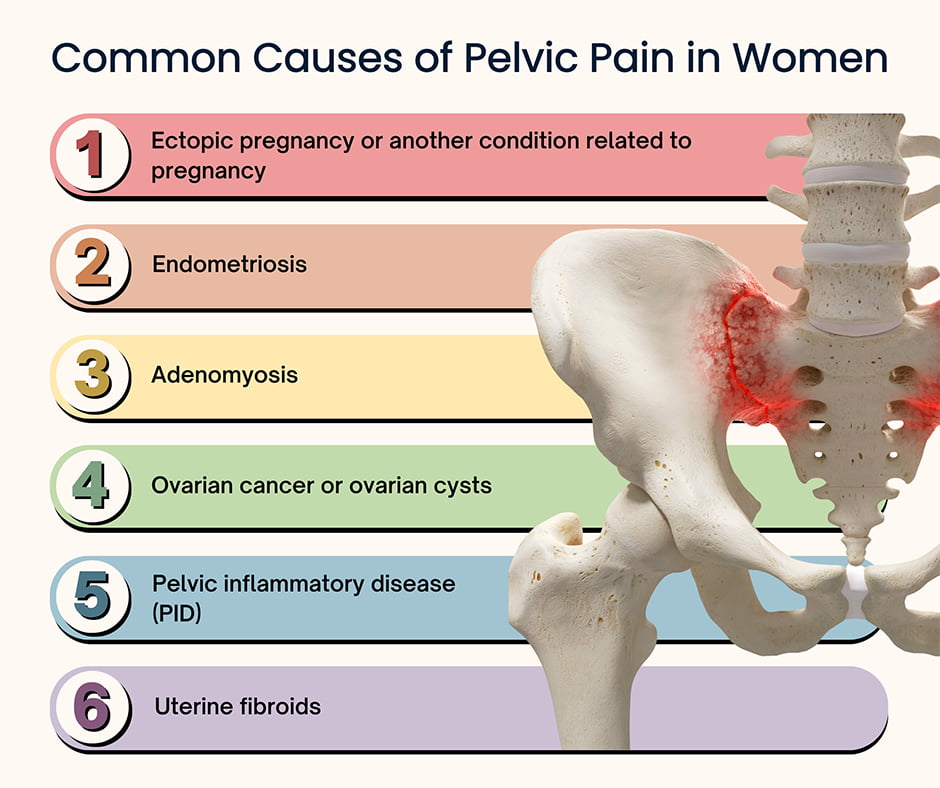Pelvic pain can disrupt so many areas of your life — from being able to sit comfortably to enjoying intimacy, from urinating without pain to doing everyday tasks while on your period. While pelvic pain in women is more common, pelvic pain in men is just as ubiquitous. The causes of pelvic pain vary widely, so rely on the expertise of knowledgeable pelvic pain specialists for a firm diagnosis and treatment, such as the ones you find in Midtown at Manhattan pain management.
You usually feel pelvic pain in the area just below your abdomen. The discomfort may be intermittent, come on as a sharp stabbing discomfort or feel like a dull ache that seems to spread throughout your body. When your pelvic pain is severe enough, it can affect your quality of life on a daily basis.
A pelvic pain specialist practiced in treating both pelvic pain in women and pelvic pain in men, such as the team at pain and injury clinic finds the source of your pain and determines the best approach to treatment. Don’t wait, because untreated pelvic bone pain can lead to serious consequences.
Symptoms to Watch For

lower back or groin and cause burning when urinating. You may experience painful ejaculations, pain in the testicles or penis or pain in the region between the anus and scrotum.
Causes of Pelvic Pain
A number of various conditions can lead to what feels like pelvic bone pain, including digestive, urinary or reproductive issues. Coccydynia is a condition that happens from trauma to the tailbone that can lead to excruciating pelvic bone pain. This can cause pelvic pain in men and women, usually after a fall or blow to the area. Coccydynia sometimes occurs in women after childbirth.
Diverticulitis is another common condition that leads to lower left pelvic pain in men and women. Chronic pelvic pain also may be due to a strain or sprain in the ligaments or muscles attached to a pelvic bone. Sometimes, the discomfort comes from damaged nerves.
Common causes of pelvic pain in women include:
- Ectopic pregnancy or another condition related to pregnancy
- Endometriosis
- Adenomyosis
- Ovarian cancer or ovarian cysts
- Pelvic inflammatory disease (PID)
- Uterine fibroids

Pelvic pain in men and in women may be due to:
Proper Diagnosis Provides a Treatment Direction
Visit a pain management specialist to find out the source of your pelvic pain, which is not always an easy task. Fortunately, at Pain Management NYC, doctors have access to the most advanced diagnostic equipment and quick, reliable lab testing to reach a correct conclusion. Giving your doctor a complete history of the pain — such as when it started and what makes it worse — gives him clues as to the cause.
Following a thorough physical exam and medical history, you may undergo imaging tests, such as a pelvic ultrasound or pelvic MRI. Lab tests discover if you have an infection. A pelvic laparoscopy may be required so that your pain doctor can actually view the area of concern. A cystoscopy allows your doctor to view inside your abdomen, while a colonoscopy may be required to inspect your colon.
If pelvic pain strikes suddenly and is severe, seek medical attention immediately. Emergency appointments are available in Manhattan at Pain Management NYC when you need them.
Pelvic Pain Treatment
Once the cause of your pelvic pain is determined, your doctor can design a course of treatment to treat the underlying condition. The goal of interventional pain management is to relieve the pain associated with pelvic discomfort while you heal. The treatment your receive depends on the cause and severity of your pain, as well as your own goals and needs.
Sometimes, over-the-counter pain relievers do the trick while your condition is being addressed. Prescription pain medicine may be used for a short period of time to address severe pain that isn’t deemed chronic. Other treatments available through your pelvic pain specialist include:
- Antibiotics when the cause of your pelvic pain is due to an infection.
- Anti-depressants can be effective for treating chronic pain, even if you aren’t depressed.
- Hormone medications such as birth control pills often reduce pelvic pain in women, particularly when your worst pain coincides with your monthly cycle.
- Spinal cord stimulators block pain signals to treat pelvic pain in men and women. They’re useful when the cause of the pain remains undetermined.
- Trigger point injections numb areas that are pinpointed as the source of your pain.
- Laparoscopic surgery may be required to remove tissue or adhesions that are causing your pelvic pain.
- A hysterectomy is the last resort, used to restore health in women with complicated problems causing pelvic pain.
Your top pain relief doctors rely on a multidisciplinary approach to treatment that may include physical therapy and counselling. Behavior modification, relaxation techniques and biofeedback also may be useful to help you deal with chronic conditions. No matter the cause, there’s no reason for you to live with pelvic pain when the best pain doctors are nearby. Contact us today for an appointment.

Leon Reyfman, MD, is a top-rated, best-in-class interventional pain management doctor. He is a nationally recognized pain relief specialist and is among the top pain care doctors in New York City and the country. He is an award-winning expert and contributor to prominent media outlets.
Dr. Leon Reyfman has been recognized for his thoughtful, thorough, modern approach to treating chronic pain. He has been named a “top pain management doctor in New York” and one of “America’s Top Doctors™” for advanced sports injury treatments. Among other accolades, he was voted by peers as a “Castle Connolly Top Doctors™” and “New York Super Doctors™”. Dr. Leon Reyfman was a part of the medical team at the 2016 Summer Olympic Games in Rio de Janeiro, Brazil.
